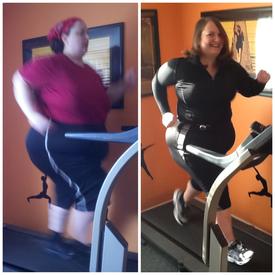Weigh less but burn more? Heart rate higher after some loss?

JewelsinBigD
Posts: 661 Member
I am so confused by this strange phenomenon. I started to think that my heart rate monitor was broken- but I am also losing again - so the higher heart rate is coinciding with the weight loss and higher burn rate. That makes sense.
What doesn't make sense is that I am burning more now that I am weighing less doing the same exercises...the only change I have made is that I stopped BodyPump since I hurt my back and my ortho told me to stop putting weights on my back for 8 weeks. No BodyPump, using weight machines for about 10 minutes after Zumba - and burning close to 600 calories instead of struggling to burn 400 in the same amount of time. When I see my heart rate in the upper 160s and lower 170s during the same Zumba class I have taken for 16 months I am confused...because 5 pounds ago it would be 20-30 beats lower...any ideas? Is my HRM broken?
What doesn't make sense is that I am burning more now that I am weighing less doing the same exercises...the only change I have made is that I stopped BodyPump since I hurt my back and my ortho told me to stop putting weights on my back for 8 weeks. No BodyPump, using weight machines for about 10 minutes after Zumba - and burning close to 600 calories instead of struggling to burn 400 in the same amount of time. When I see my heart rate in the upper 160s and lower 170s during the same Zumba class I have taken for 16 months I am confused...because 5 pounds ago it would be 20-30 beats lower...any ideas? Is my HRM broken?
0
Replies
-
Your fitness is improving the heart is just another muscle that improves with use, I am seeing equally good improvements at the age of 54 I now exercise in the 145-155 range comfortably for over an hour after two months and 25lb lost, at the start 12 Aug 2013, I struggled to maintain 120 for 20 mins the burns are also higher as a result.0
-
That is fantastic lucan07! I am glad to hear that my HRM is probably not broken! Congrats on the loss!0
-
Heart rate monitors are designed to extrapolate burns from steady state cardio exercises like running and biking. They will not be anywhere near accurate for weight machines or really any kind of strength training. That is not what they are designed to do with ny degree of accuracy.0
-
Heart rate monitors are designed to extrapolate burns from steady state cardio exercises like running and biking. They will not be anywhere near accurate for weight machines or really any kind of strength training. That is not what they are designed to do with ny degree of accuracy.
^^^ This.
To be honest, based on your description, it sounds like your fitness level is going down, not up. But it's difficult to be certain without lots more details.0 -
That would confuse me, too, because supposedly the more fit you get, the lower your pulse gets. But maybe that's only your resting pulse and not your pulse while exercising? What I would suggest is taking your pulse for a full minute at a time when you are rested and quiet, ideally before you get out of bed in the morning. If you've never done that, find your pulse in the inside of your wrist, where a watch would be. (I prefer that to the neck pulse, which in my case is difficult to find.) Use a clock or watch with a sweeping second hand. Keep doing that and see if it's not going down over time. I read somewhere that Lance Armstrong's resting pulse is in the 40s!0
-
Have you changed the weight on your HRM? I have an HRM that links up to runtastic and I update the weight on their every week after I weigh in for more "accurate" HRM readings.0
-
Just a stab in the dark but you are probably upping the intensity of your workout without realizing bc you are in better shape now.0
-
Just a stab in the dark but you are probably upping the intensity of your workout without realizing bc you are in better shape now.
I'd feel inclined to agree with this fella.0 -
That would confuse me, too, because supposedly the more fit you get, the lower your pulse gets. But maybe that's only your resting pulse and not your pulse while exercising? What I would suggest is taking your pulse for a full minute at a time when you are rested and quiet, ideally before you get out of bed in the morning. If you've never done that, find your pulse in the inside of your wrist, where a watch would be. (I prefer that to the neck pulse, which in my case is difficult to find.) Use a clock or watch with a sweeping second hand. Keep doing that and see if it's not going down over time. I read somewhere that Lance Armstrong's resting pulse is in the 40s!
My resting pulse is now down in the 40's too 49 from high 70's early 80's recovering from serious illness and three major surgeries. In last two months I have stopped all medication allowed reluctantly by consultant, lost 25lbs, VO2 max in 8 weeks going from 21 to 37 and general health improvement he now agrees I was right.0 -
Just a stab in the dark but you are probably upping the intensity of your workout without realizing bc you are in better shape now.
I'd feel inclined to agree with this fella.
I totally agree on the Rower my flat out 2000mtr time was 11 minutes on lowest setting August 12th, now I am down to 7m 20secs on setting 5 of 8 and still feel I am capable of more.0 -
Consecutive high intensity exercise days will cause my heart rate to be higher doing the same activity than a workout session after a rest day.0
This discussion has been closed.
Categories
- All Categories
- 1.4M Health, Wellness and Goals
- 395.7K Introduce Yourself
- 44.1K Getting Started
- 260.7K Health and Weight Loss
- 176.3K Food and Nutrition
- 47.5K Recipes
- 232.8K Fitness and Exercise
- 447 Sleep, Mindfulness and Overall Wellness
- 6.5K Goal: Maintaining Weight
- 8.6K Goal: Gaining Weight and Body Building
- 153.2K Motivation and Support
- 8.2K Challenges
- 1.3K Debate Club
- 96.4K Chit-Chat
- 2.5K Fun and Games
- 4.3K MyFitnessPal Information
- 16 News and Announcements
- 1.3K Feature Suggestions and Ideas
- 2.9K MyFitnessPal Tech Support Questions







